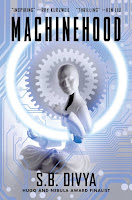 |
| (Image via Goodreads) |
It’s an observation based on a familiar pattern of workers becoming managers and then acting in ways that put them at odds with the needs of the proletariat. The system incentives people to make decisions that serve the few instead of the many.
This is, fundamentally, the problem with John Scalzi’s latest novel. Starter Villain is narrated in the first person by Charlie, an underemployed and financially precarious teacher who inherits a megacorporation after the death of his estranged uncle Jake. Charlie quickly learns that Uncle Jake’s business empire involved global extortion, illicit genetic experiments, and orbital laser platforms; the protagonist inherits the role of corporate supervilain.
It’s an amusing and intriguing premise … one that could have been used to interrogate capitalist systems of power. Instead, Charlie is presented with a series of facile moral quandaries that are resolved when his ‘common-sense’ and ‘hometown values’ lead him to simplistic solutions for complex situations.
He’s a boss … but he avoids acting like a boss because the book skirts around the perverse incentives that (in the real world) drive many in the management class to act like psychopaths. The novel suggests that the evils of capitalism are not based on structural problems, but on the fact that the wrong people are in charge.
Possibly the most egregious example of this is in how Charlie deals with workers’ rights at his secret volcano lair. Early in the novel, he’s introduced to a pod of genetically enhanced intelligent dolphins, and he learns that they have formed a labour union in order to demand better compensation and working conditions. Although the complaints of the dolphins are depicted as being valid, their negotiating tactics are portrayed as obstreperous and confrontational. That is, the reason they have been unable to resolve their contract negotiation is because of worker intransigence. This dispute is resolved when Charlie takes the time to listen to the workers without getting angry at their antics.
The problem with this understanding of labour relations is that it diminishes the agency of the workers and portrays the skills of managers as superior instead of specialized.
Now, it should be noted that this type of labour union depiction is a significant improvement over the anti-worker rhetoric that was common in science fiction of the 1940s-1970s. But it is still based on ideas of management-class paternalism; this is a story in which the liberation of the cetacean proletariat derives not from the emancipation of the worker but from the benevolence of management. However, in reality, anything that can be offered by a good boss can be denied by a bad one.
 |
| Maybe it's a bad idea to put people into positions of authority based on who their uncle was. (Image via NPR.com) |
Ignoring worker perspectives has a long tradition in science fiction stories. Scalzi’s work fits neatly alongside Asimov’s, Dick’s and Pohl’s; evidently well-intentioned towards workers, but ultimately reinforcing management supremacy and failing to platform worker agency.
One highlight of Starter Villain, however, is a denouement which relies on worker-led interspecies solidarity. Not only is this a philosophically coherent plot mechanism, but it showcases percussive action that few authors writing today are capable of.
Scalzi is an author whose work we’ve often admired. His brand of quippy, accessible prose is often entertaining and fun. The Collapsing Empire novels were engaging and well-thought out parables about the dangers of science denial. Old Man’s War is a modern classic for a reason. But Starter Villain hews to some of Scalzi’s more irritating writerly quirks; a protagonist who’s a bit too smug propped up by smart-alec sidekicks. This is admittedly a comedic novel … and nothing is more subjective than comedy. So this farce might be more to some peoples’ tastes than ours.
Not all labour unions are created equal, and nor are depictions of labour unions in science fiction. The past few years have seen some of the best SFF about labour unions ever published (among others, we’d highlight Babel by R.F. Kuang,
One highlight of Starter Villain, however, is a denouement which relies on worker-led interspecies solidarity. Not only is this a philosophically coherent plot mechanism, but it showcases percussive action that few authors writing today are capable of.
Scalzi is an author whose work we’ve often admired. His brand of quippy, accessible prose is often entertaining and fun. The Collapsing Empire novels were engaging and well-thought out parables about the dangers of science denial. Old Man’s War is a modern classic for a reason. But Starter Villain hews to some of Scalzi’s more irritating writerly quirks; a protagonist who’s a bit too smug propped up by smart-alec sidekicks. This is admittedly a comedic novel … and nothing is more subjective than comedy. So this farce might be more to some peoples’ tastes than ours.
Not all labour unions are created equal, and nor are depictions of labour unions in science fiction. The past few years have seen some of the best SFF about labour unions ever published (among others, we’d highlight Babel by R.F. Kuang,
We Built This City by Marie Vibbert, & Hunger Makes The Wolf by Alex Wells). Simply put, Starter Villain falls short.





